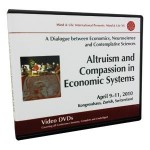Mind and Life “Ecology, Ethics & Interdependence”
HERE >>> http://www.mindandlife.org/dialogues
Mind and Life XXIII
Ecology, Ethics and Interdependence
with His Holiness The Dalai Lama
Dharamsala, India • October 17 – 21, 2011
Remember- less than half a day until the first live webcast of a Mind and Life conference with His Holiness the Dalai Lama! “Ecology, Ethics and Interdependence” promises to be a very important and timely dialogue in light of our relationship to this changing planet.
Live broadcasting by Ustream Unfortunately, as this will be a small, private meeting, it will be impossible to invite additional participants to attend Mind and Life XXIII. However, the proceedings of the conference will be webcast live, beginning October 17th. Please note that the sessions begin at 9:00 am and 1:00 pm Indian time. If you experience problems viewing this video, you can also see it at http://dalailama.com/live-english The sessions will be available for streaming and download after the event at http://dalailama.com/webcasts
Conference Overview The slow meltdown of Earth’s capacity to sustain much of life, as we know it, poses an urgent challenge for both spiritual traditions and science. These two ways of knowing have developed distinctive responses, which are potentially synergistic.
The goal of the meeting is to provide an opportunity to articulate an engaged environmental ethics. This would include the understanding of interdependence through an examination of the most recent data on the scientific case for effective ecological action. Furthermore, it will be a unique opportunity to meet with other faith traditions that have arrived at a religious basis for motivating environmental activism.
A dialogue between contemplative scholars, activists and ecological scientists could enrich the response to our planetary crisis. Insights from the new thrust in ecological science evoke the deep interconnections between individual choice and planetary consequence as well as through cross-fertilization of ideas and meaningful action among activists working within their own spiritual framework.
We will explore many dimensions, from the human-caused deterioration in the global systems that sustain life, and the role each of us plays as seen through the lens of industrial ecology, to a view from Buddhist philosophy and other faith traditions, to the on-the-ground realities faced by ecological activists. Our hope is that this conference will be a significant catalyst for the formulation of new research ideas in these fields and solutions to our planetary crisis.
The conference serves as a catalyst for new research projects and economic initiatives that promote personal responsibility, fairness, cooperation and compassion. “Altruism and Compassion in Economic Systems” traces the roots of altruism, the biological components of compassion, experiments in trust and the potential of economics based less on ‘profiting me’ and more on ‘helping you.’ An economic system that pays more attention to the importance of human interactions will lead to more cooperation, less greed and greater happiness. At the heart of this dialogue is the understanding that altruism and compassion are integral to the realization of a society aligned to the benefit of all its members. The Dalai Lama participated fully in all sessions recorded on this DVD set.
The Mind and Life Institute is dedicated to fostering dialogue and research at the highest possible level between modern science and the great living contemplative traditions, especially Buddhism. It builds on a deep commitment to the power and value of both of these ways of advancing knowledge and their potential to alleviate suffering.
The ongoing global financial crisis shows clearly just how vulnerable economic systems are to human behavior, particularly to corruption and greed. This strongly suggests that other qualities, such as empathy, pro-social motivation, altruism and compassion may play an essential role in our increasingly competitive global economic system.
But can we really imagine an economic system that delivers prosperity and welfare, or is competition an unavoidable consequence of the human race? How can we, as individuals, help form a society that is both productive and resolves actual societal and environmental problems? What have the sciences to contribute – if anything at all?
By bringing together some of the world’s leading minds, the Mind and Life XX Conference highlights the benefits and limitations of altruism and compassion in economic systems.
This offers a unique opportunity to follow a high-level, interdisciplinary exchange of scientists and economists focusing both on individual thinking and the structure of economic systems. Thus, the conference build bridges between different disciplines and serve as a catalyst for new research projects and economic initiatives promoting personal responsibility, fairness and compassion.
mindandlifeorgMind&Life Institute
Live webcast of Mind and Life XXIII – Ecology, Ethics and Interdependence in Dharamsala, October 17-21! http://fb.me/JCEczEGh
60 years ago, the Universal Declaration of Human Rights proclaimed a wide spectrum of human rights that every human being has – without discrimination. They include not only rights to freedom of expression and freedom from torture and ill-treatment, but also rights to education, to adequate housing and other economic, social and cultural rights. Economic, social and cultural rights are a broad category of human rights guaranteed in the International Covenant on Economic, Social and Cultural Rights and other legally binding international and regional human rights treaties. Nearly every country in the world is party to a legally binding treaty that guarantees these rights.
They include:
- rights at work, particularly just and fair conditions of employment, protection against forced or compulsory labour and the right to form and join trade unions;
- the right to education, including ensuring that primary education is free and compulsory, that education is sufficiently available, accessible, acceptable and adapted to the individual;
- cultural rights of minorities and Indigenous Peoples;
- the right to the highest attainable standard of physical and mental health, including the right to healthy living conditions and available, accessible, acceptable and quality health services;
- the right to adequate housing, including security of tenure, protection from forced eviction and access to affordable, habitable, well located and culturally adequate housing;
- the right to food, including the right to freedom from hunger and access at all times to adequate nutritious food or the means to obtain it;
- the right to water – the right to sufficient water and sanitation that is available, accessible (both physically and economically) and safe.
Who is responsible?
States – national governments – bear the primary responsibility for making human rights a reality. Governments must respect peoples’ rights – they must not violate these rights. They must protect peoples’ rights – ensuring that other people or bodies do not abuse these rights. And they must fulfil peoples’ rights, making them a reality in practice.
Governments have widely differing resources. International law allows for the fact that making economic, social and cultural rights a reality can only be achieved progressively over time. However, the duty of governments to respect and protect these rights and to ensure freedom from discrimination is immediate. Lack of resources is no excuse.
Although governments may need time to realize economic, social and cultural rights, this does not mean they can do nothing – they have to take steps towards fulfilling them. As an initial step, they must prioritise “minimum core obligations” – minimum essential levels of each of the rights. Under the right to education, for example, core obligations include the right to free primary education.
Governments must not discriminate in their laws, policies or practices and must prioritize the most vulnerable when allocating resources.
States also have obligations when they act beyond their borders to respect, protect and fulfil economic, social and cultural rights. These obligations extend to action they take through intergovernmental organisations such as the World Bank and the International Monetary Fund (IMF).
As stated in the Universal Declaration of Human Rights, “every organ of society” has human rights responsibilities. Corporations play an increasingly significant role globally in the realization or denial of human rights. Amnesty International is committed to holding businesses accountable where their actions result in human rights violations
Despite international guarantees of these rights, across the world:
- 923 million people were suffering from chronic hunger. Hunger is often driven by human rights violations, as Amnesty International has documented in North Korea, Zimbabwe and elsewhere. The current world food crisis, which itself has been fuelled by human rights violations, has led to an additional 75 million people being chronically malnutritioned.
- Over a billion people live in ‘slums’ or informal settlements, with one in every three city residents living in inadequate housing with no or few basic services. Their situation is worsened by a global epidemic of mass forced evictions.
- Every minute, another woman dies because of problems related to pregnancy. For every woman who dies, 20 or more experience serious complications.
- Over 100 million children (more than half of whom are girls) do not have access even to primary education.
This work is part of Amnesty International’s Demand Dignity campaign, which aims to end the human rights violations that drive and deepen global poverty. The campaign will mobilize people all over the world to demand that governments, corporations and others who have power listen to the voices of those living in poverty and recognise and protect their rights. For more information visit the Demand Dignity section.
Comments are closed.


